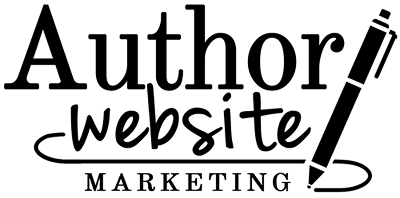20 Content Marketing Ideas That Authors Should Try (With Examples)
If you’re an author trying to market your book, hopefully you’ve adopted a content marketing strategy. This softer style of selling is both more effective and more fun than grabbing a megaphone and blasting I’VE GOT A BOOK OUT at everyone on social media.
Here are 20 suggestions of content you could create to grab new readers’ attention or to turn casual readers into fans. If your author website is looking a little dusty, or if you’re struggling with what to write in your monthly author newsletter, these content ideas will be invaluable.
1. Novellas and short stories
Hey, you’re a writer? So write something!
Give readers a taste of your writing style by giving away a short story or (even better) a novella or full-length novel ebook. For maximum effect, make the story look as “novel-y” as possible with a great cover and tagline.
For example, fantasy/crime author JF Penn gives away a free ebook copy of her novel Day of the Vikings in exchange for an e-newsletter sign-up. The ebook is available to buy on Amazon for £1.99/$2.99, so any reader who nabs it for free feels like they’re getting real value – because they are!
OK, this is an easier giveaway to accomplish if you’re a self-published author with dozens of books to your name. But even if all you’ve got is a short story to give away, it’s still something of value. Do it. What do you have to lose?
2. Bonus chapters
What does every reader want when they get to the end of a compelling book? More book!
Give your readers what they want by sharing bonus chapters. This could mean a prequel short story, an “after the happily-ever-after” epilogue, a key chapter written from another character’s POV, a “side quest” you cut for pacing.
I wrote a trio of “killer stories” giving insight into the bad guys’ perspectives from my mystery-thriller The Getaway.
No, this type of content won’t hook new readers, but it’s a great bonus for existing readers. It will make them remember you – and hopefully buy your next book.
3. Maps, articles and ‘declassified’ documents from your novel
Bonus material from your novel doesn’t have to mean extra chapters. It could be anything supplementary.
If you created a place (or planet), it might be a map. If your novel features a journalist character, share the full text of their articles (if they’re interesting and relevant). What about a character’s FBI file?
There are loads of low-effort extra things you could share from your months or years of writing.
For example, I created a map of the fictional private island featured in my novel The Getaway.
4. A guide to the real places featured in your novel
If your novel is set in a fascinating or beautiful place, your readers will almost certainly be interested in the reality behind the fiction. Take them on a virtual tour of your real-life setting, with photos, descriptions, and what you found inspiring about that particular place.
It’s literary tourism without the air fare.
Check out photos of the places in the British Virgin Islands that are featured in The Getaway.
5. Interesting facts you learned from your research
Just as you can talk about the real places connected with your novel, you can also share juicy details of the real stories that inspired your fiction.
Every author does more research than they can ever hope to use in their novel. Here’s your chance to turn some of it into an article or ‘listicle’.
6. Recipes
It’s a trope of cozy mysteries to include in the text of the book what the characters ate and how to make it yourself. Regardless of which genre you write in, why not build on this trend yourself?
If your characters eat something delicious within your story, share on your author website the recipe.
7. Quizzes and games
Embrace the silliness by sharing a quiz or game (think scavenger hunt, treasure trail, whatever you like) related to your novel.
For crime writers, sharing a murder mystery game is bang on brand. For example, thriller writer Ruth Ware gives away all the materials for a murder mystery game on her website.
(Fun fact: I’m a fan of Ruth Ware, but I actually discovered her murder mystery game when I was googling around, looking for inspiration for organising my own murder mystery evening. Now that’s what you want: to give away content that’s easy to ‘stumble upon’.)
8. Pull back the curtain on your writing process
Publishing can be a strange and mysterious world to outsiders, so why not de-mystify some of it for readers?
There’s a reason writers always get asked “where do you get your ideas from?” and “are you a plotter or a pantser?” People are interested. So share insights into how you write and why you write.
9. “How I got published”
The biggest question writers are asked is how they got published and, its sister question, how they found their literary agent. The trials and tribulations of self-publishing are also inherently interesting. Everyone’s story is different – and it’s worth sharing yours.
10. Video essays
A lot of the suggestions so far have been text-based, but there’s no reason you can’t create videos instead. This might mean longform YouTube videos, or 30-second social media videos.
Video essays about writing craft and how to get published do big numbers on YouTube. (For example, YA author Alex Donne does great video essays about writing craft.)
If you’re a good cook, film yourself cooking those recipes mentioned above, or take your readers on a tour of the settings featured in your novel.
Of course, video editing is an additional skill set that most authors don’t have. But your videos don’t need to be long or complicated. You can also make videos without showing your face if that’s a concern for you.
11. Guest on a podcast… or start your own
There are loads of book- and author-centric podcasts out there. If you message the hosts (politely), you may be able to pitch yourself as a future guest.
Think about what makes you unique and therefore interesting to podcast listeners. (Maybe it’s that you used to work in prisons like Jane Corry or perhaps your route to publication was unusual.)
Don’t forget to prepare for the podcast. Here are my 5 tips for killing it in your next podcast appearance.
Hell, if you enjoy podcasts, you might decide to start your own. JF Penn has made a second career out of her hugely helpful Creative Penn podcast.
12. Bookstagram and BookTok
If you’re a writer, you undoubtedly read a lot. So make your reading visual by taking lovely book-as-art-object photos for Instagram, or by making videos for TikTok.
Regardless of how you choose to do it, it’s great content marketing to…
13. Recommend books similar to your own
Whether you do it on social media or on your website (or, even better, both), boosting other writers in your same genre will make you feel good and also provide a handy guide for people who are wondering what to read next.
14. Photo essays (of your book launch or author events)
I love “in pictures” blog posts because they’re easy to create and easy to read (after all, there is no reading involved!). Give visitors to your website a taste of an event by posting a series of photos of what happened.
This is great for book launch pictures or author event photo sets. If a reader isn’t able to physically attend the event, they’ll still want to see what happened and feel like they were there.
15. Eye-catching graphics
Social media is a visual medium, so scrollers are more likely to stop scrolling if you hit them with a beautiful graphic.
Your graphics might feature short reviews of your book, or they might feature quotes from the novel itself, or even an infographic drawn from your behind-the-scenes research.
Whether you’d like to get professionally-designed graphics, or do if yourself using Canva, these types of visual posts can be a real winner.
16. Pictures of your pets (I’m not kidding)
Some forms of content marketing can be time-intensive (yeah, sure, you don’t want to spend hours slaving over Canva), in which case, may I suggest… sharing pictures of your pets?
Everyone loves a pet photo. Tell me your bunny’s name! Tell me why your cat is an evil genius! Tell me why your dog is a very good boy!
In all seriousness, pet pics can humanise you as an author, giving readers a glimpse into your life outside writing. And they’re a dead-cert crowd-pleaser.
17. Personal updates
On a similar note, don’t forget to share personal updates with your readers, on your author website or newsletter.
You’ll need to choose how far you pull back the curtain (many authors don’t share photos or even names of family members, for privacy reasons). But even if you just tell people which TV show your bingeing or how you spent your weekend, it’s more interesting than you think (I promise).
For example, I don’t know historical author Helen Yendall personally, but her blog is so chatty and personable that I feel like I do know her.
18. Interviews with other authors
A bedrock principle of marketing is “people are interested in other people”. That’s why you share information about yourself. Interviews with other authors are an extension of that.
Most authors, if you approach them through social media, will happily answer a few interview questions over email.
Check out my Grilling Thriller Authors series where I spotlight a different psychological thriller author each month.
19. Interviews with people in publishing
Don’t just consider interviewing other authors. There are loads of people involved in the publishing process: editors, agents, cover designers, audiobook readers, etc.
For example, I interviewed the voice actor who read the audiobook of my first novel, Dead Ringer.
20. Start a hashtag trend
Most authors on social media just use the hashtag for their novel (e.g. #TheGetaway) and leave it at that.
However, to be more ambitious, why not start a hashtag that could be used by others in an interesting way?
If your novel is about the worst holiday ever, you might start the hashtag #HolidayFromHell and invite people to post about their bad holidays. You’d be surprised at how quickly such hashtags can take off.
Phew! Hopefully that’s enough content ideas to get you started.





